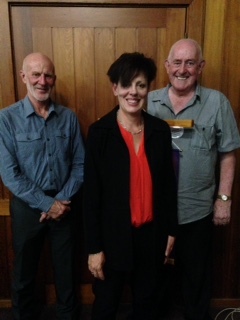GUEST SPEAKER - DR ERIC FAIRBANK, WARRNAMBOOL HOSPICE
John Stuckey introduced our guest speaker Dr Eric Fairbank and provided some background information. Dr Eric Fairbank graduated from Melbourne University in 1968. Following two years residency in Warrnambool, another two in Papua New Guinea and one at Box Hill, he returned to Warrnambool to become one of a two-doctor GP practice. At that time, GPs in Warrnambool did all of their own anaesthetics, delivered babies and were on call almost 24/7. Things changed in the 80s when an influx of specialists saw GPs less involved in the hospital scene. That’s when Dr Fairbank decided to pursue his interest in palliative care and gain more qualifications through Flinders University. In 1986 he was instrumental in establishing the Warrnambool Base Hospital’s Palliative Care Unit – of which he was the Director until retiring in 2013. In 2012 Dr Fairbank received a Victorian Rural Doctor Award for the profound impact he has had on the health and wellbeing of local communities. In 2013 Dr Fairbank was honoured with the Victorian Public Healthcare Award recognising more than 35 years work providing exceptional healthcare for hundreds of people facing the biggest fight of their life.
His work has had a profound effect on his colleagues, students, nurses, palliative care staff, volunteers, and most importantly on patients and their families.He has helped shape the way palliative care is delivered in Warrnambool, and his influence is now felt nationwide and internationally.
According to Dr Fairbank those of us who prepare for death do it better than those who don’t. 85% of people die from a chronic illness - rather than an accident of some kind. Those with chronic illness such as cancer patients tend the have a reasonable quality of life during a prolonged lead up followed by a shorter end stage death. Other people die from some sort of organ failure such as heart, kidneys and lungs etc and they tend to have a more drawn out end of life with critical health incidents followed by periods of some degree of recovery, before they finally die. Yet another group die as a result of old age frailty and dementia. The Base Hospital SWH has 6 palliative care beds, SJOG hospital has 2 palliative beds and Lyndoch also has some beds.
In the next 25 years deaths will double as the baby boomers reach the ages of 75 to 95 years.
70% of the population say they want to die at home but in reality Australia-wide the percentage of people who die at home is less than 15%. People don’t prepare well for death and death is seen as a medical event when it is in fact a normal stage of the life span. Dying is not a medical event and if you want a good quality of life and a good death you are better off at home.
It costs three times as much money to die in a hospital - $19,000 and around $6,000 to die at home. In the terminal phase to die in a hospital costs around $800 per day. A patient dying at home supported by Hospice in the Home costs around $125 per day.
The Hospice in the Home program is still very new and although initially they wanted a purpose built building, this was decided against because of the cost ($1,000 a day to keep a hospice open and running). Hospice in the Home has been very fortunate to have been offered a building at Deakin for $10 per annum rent. This building is furnished like a home and is a teaching facility to teach family members and friends how to use various bits of equipment and how to care for dying friends and family members. They are in the process of training non-medical volunteers to work with families caring for a dying person. The volunteers will assist with aspects of patient care to ease the burden on family members and they will also provide overnight and weekend respite. The first group will finish their training on 13 July 2015.
Hospice in the Home trained volunteers working in the homes of terminally ill people are supported by comprehensive assessments carried out by the Palliative Care team, District Nurses, on call Doctors and Ambulance staff.
Dr Fairbanks explained that so far the Hospice has raised around $250,000 and they need to double this figure in the next year or so. They hope to get some larger donations from various trusts and also from the Government once they have some facts and figures to justify why they need funding.
Rotarian’s were also introduced briefly to Kerry Robertson who is in charge of fund raising at Hospice in the Home. Kerry has some sort of fund raising activity happening most of the time and in early 2016 they are planning a Marigold Ball (Bollywood style) at Deakin.
Dr Fairbanks thanked the Club very much for nominating Hospice in the Home as the charity to be the main recipient of funds raised by the Dinner Auction in May 2015.
